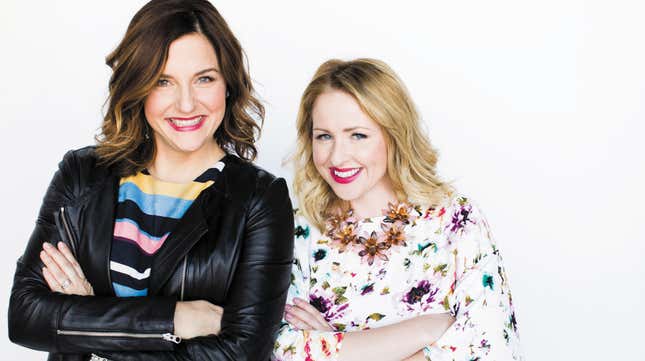

Kristin Hensley and Jen Smedley are the wry, inappropriate mom comedy-duo that the pop culture rebellion against perfect motherhood hath wrought. In their viral #IMomSoHard YouTube series, and elsewhere, they dish outrageously on post-baby “ski slope” boobs, hairy nipples, flabby tummies, and “broken” nethers (“like a basset hound with its head out the window, just flapping in the wind”). They rant about kid germs, clueless husbands who put clean diapers on top of dirty diapers, and the tyranny of Pinterest cake pops. And, of course, they are fixated on wine (i.e. the “happy juice” that gets them through it all).
Wine is so essential to their brand of motherhood that they hold glasses of it on the cover of their new book, #IMOMSOHARD, which was released on Tuesday. An illustration of a glass of red wine appears on the bottom of every other page. The generously poured glass slowly empties—only to be refilled and emptied again. In a YouTube video titled, “I Wine So Hard,” they cheer and Smedley says, with exhaustion, “Made it through another day.” Hensley replies, “You know what’s in this glass? Hope.”
The real-life best friends, who grew up in Nebraska and now live in Los Angeles, started #IMomSoHard out of an earnest desire to make other moms feel better about themselves by revealing their own imperfections. In their YouTube clips, and Facebook Live videos, they sip red wine—mimosas, if it’s early—in the kiddie play area at Smedley’s house. Toys are often strewn emblematically in the background. They talk about such subjects as lying to your kids, mommy poop breaks, and the embarrassing contents of their “mom bags” (“I do have a razor, because I have a sweet mustache and full beard”). Occasionally, they tackle weightier topics, like postpartum depression.
The talk often segues into physical comedy—for example, a failed attempt at exercise that ends with the pair trying to drink mimosas while wearing boxing gloves. In a wildly popular video, they try on swimsuits with youthful cut-outs for humorous effect. “Can’t even call it baby weight anymore,” says Hensley of herself during the segment. “Just call it weight.”
Their schtick is one of rebelling against, sometimes guiltily succumbing to, but never actually escaping the paradigm of perfect motherhood. Hence the interminable need for a “#heavypour” and “#wine” and “#morewine,” as they often put it on social media. It’s a brand of laughs with the potential for catharsis and mild disobedience, but it also runs the risk of bolstering stereotypes and numbing the pain of parental inequity (like so many glasses of red wine).
“Their schtick is one of rebelling against, sometimes guiltily succumbing to, but never actually escaping the paradigm of perfect motherhood.”
It is somewhat concerning, then, that this schtick appears to powerfully resonate with quite so many moms—or, at least, white, heterosexual, married, middle-class moms. But it’s also not surprising, given the broader mainstream backlash against maternal expectation. The past decade has seen the rise of “wine mom” culture, which has found commercial expression in countless “mommy juice” wine tumblers on Etsy and “mommy needs her wine” memes. In 2015, the popular Facebook group Unicorn Moms launched with the tagline, “Perfect moms are like unicorns; they don’t exist.” A year later, the same year the #IMomSoHard YouTube series launched, there was the release of Bad Moms, a Hollywood film written by two men about a group of imperfect moms who endeavor to “bring down” the perfect moms at their children’s school. We’ve also seen the phenomenon of “brutally honest” post-baby photos unflinchingly depicting women’s supposed bodily imperfection.
Hensley and Smedley have successfully tapped into that market. Late last week, they posted a video alerting fans that their book was very close to hitting the New York Times bestseller list thanks to a massive influx of pre-orders. The book’s early success is no doubt helped by their 1.3 million Facebook followers. On YouTube, their top video—titled “I Spanx So Hard,” in which the pair humorously contort themselves into multiple layers of modern corsetry—has 1.2 million views.
Their success is probably worth celebrating. They are whip-smart, wildly funny, highly likable, and dirty-minded. It’s certainly an improvement upon the suffocating cult of Pinterest-perfect motherhood, to which #IMomSoHard is a reaction. “While we were checking our Instagram accounts and happily scrolling through Pinterest, this little worm started to whisper in our ears that to be considered a good mom, everything has to be homemade, it has to be the best, and it has to be photographed within an inch of its life, using the right filters to showcase how incredibly charming and adorable your children are,” they write. “Heaven forbid we just go to Target and buy some stuff.”
-

-

-

-

-

-

-

-

-

-

-

-

-

-

-

-

-

-

-

-

-

-

-

-

-

-

-

-

-

-

-

-

-

-

-

-

-

-

-

-








































